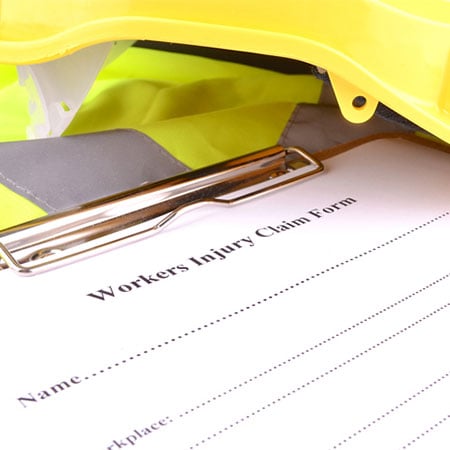

Texas worker’s compensation insurance and non-subscriber claims are designed to be difficult for injured people to navigate without the help of an experienced attorney. The system is designed to be complicated so that people get discouraged and give up before getting the benefits they deserve.
The good news is that injured workers don’t have to navigate the system alone. At VB Attorneys, we know that information is power. When injured workers are informed about their legal rights and have an attorney to help them, they get the medical care and compensation they deserve. Time is not on their side. The longer injured workers wait to consult with an attorney, the more time the company and the insurance company have to find ways to minimize or eliminate their claim. That is why injured workers in Texas should consult with a personal injury attorney who specializes in work injury lawsuits and non-subscriber claims as soon as possible.
What injured employees need to know after a work accident in Texas:
Challenges with Texas worker’s comp insurance
Worker’s compensation insurance is meant to protect workers who are hurt on the job, and most workers who are hurt on the job in other states get benefits through that program. However, workers who get hurt in Texas face some challenges:
- Unlike every other state in the United States, Texas does not require employers to carry workers’ compensation insurance. This means that workers and their families can be met with a mountain of out-of-pocket expenses after an accident at work.
- The Texas Worker’s Compensation system is run by huge insurance companies, so workers almost always get the short end of the stick. Workers might have to fight with these large companies just to get their basic worker’s compensation benefits.
- Some employers in Texas don’t have worker’s compensation insurance and don’t carry any other insurance, either. For example, companies like David Weekley Homes and Perry Homes have been notorious for hiring “independent contractors” so they don’t have to pay for any accidents, injuries, or insurance.
- Some large employers are also notorious for giving millions of dollars to shadowy groups that try to influence the law so it helps employers and hurts the people that do the work and make money for the company.
To say the scales are tipped against injured workers in Texas would be an understatement. If you are injured on the job in Texas, you will either be forced into the worker’s compensation system, which is a constant battle against the insurance company, or you will be looking at suing your employer to recover medical bills, lost wages, and any other damages—in which case they will likely hire a large law firm with lots of lawyers to fight you every step of the way. However, if you know your rights and find an attorney willing to fight for you, you may be able to recover fair compensation. Here are some answers to help you get started.
What happens when an employer does not carry worker’s compensation insurance?
Texas does not require that companies carry worker’s compensation insurance, although most companies do choose to have it because it protects them from being sued should an employee be injured on the job. As long as the employer is a subscriber to the worker’s compensation plan, injured workers must file through workers’ compensation. If an employer chooses not to have worker’s compensation insurance, and an employee is injured at work, the employee can sue the company directly, something that they would not be able to do if the company carried worker’s compensation insurance.
However, some employers in Texas do not carry worker’s compensation insurance. These companies are called “non-subscribers.” In these claims, the employee gains the right to sue his or her employer to recover compensation for the injury, and the employer loses the right to certain defenses that could limit the worker’s claim. One of the main defenses the company loses is to try to blame the worker for causing the accident. The worker only has to prove that the employer was one percent negligent for the employer to be responsible for all of the damages related to the injury.
A valid non-subscriber case has the potential to be very valuable. If you are told your employer has no worker’s compensation insurance, you will want to find out whether you have a valid non-subscriber case. An attorney experienced with work injury claims can evaluate your case, answer your questions, and determine whether you have a case. We have handled many similar cases, like the one we handled for a young worker who was hurt on the job while working with industrial printing equipment that we settled for $985,000.
What is a “third-party” claim for a work injury?
In many cases, an injured worker has a claim against someone other than the employer, even though the injury happened while they were working. The employee may be able to file a “third-party” claim against the person or company that contributed to the accident or injury. For example, someone who is hurt at work because a piece of equipment was defective may have a “third-party” claim against the manufacturer of the equipment. Find out when you might have a “third-party” case after a work injury.
VB Attorneys has successfully handled literally hundreds of third-party work injury cases. For example, we resolved a case for a lead man who hurt his back in a crane accident. Even though his employer had workers compensation insurance, VB Attorneys built a case against the crane operator’s employer.
What happens if a worker’s compensation claim is unfairly delayed?
Courts seem reluctant to punish the employer for failure to file timely paperwork. Instead, they focus on preserving the employee’s right to receive his or her benefits. However, it may be possible to bring a separate action against an employer for intentional misconduct or breach of the duty of good faith and fair dealing. Also, if it is shown that the employer’s delay has caused another injury, and that delay was willful or the result of gross negligence, the employee may be able to seek compensation for damages sustained as a result of the employer’s conduct.
If you are concerned that your employer didn’t file your worker’s comp claim in a timely manner, please contact our experienced injury attorneys to discuss your situation and find out if you are eligible to bring a separate lawsuit against your employer.
What if an employer hasn’t told the truth about subscribing to worker’s compensation insurance?
If you are hurt, and your company is covered under worker’s compensation, then the company should have already provided paperwork indicating that your claim has been filed with the Texas Department of Insurance. By law, your medical bills should be taken care of, regardless of how you were injured on the job.
However, sometimes companies will tell an injured worker that the company has worker’s compensation when, in fact, the company does not. Here’s a scenario:
You were injured while working on the assembly line for your employer. Your job was to make diesel engines. On the day you were injured, another employee was horsing around and shoved your co-worker into you, which caused you to get your hand caught in the conveyor belt. You lost four fingers and have been off work for three months while on medical leave. When you reported the injury, the company said that worker’s compensation would cover the injury and your wages. You made a claim with worker’s compensation but was told your company does not have worker’s compensation coverage. When you reported to the company that your claim was denied, the company admitted that the policies that the company bought were not actually worker’s compensation insurance like they thought. Can you still bring a claim against the company for your injuries?
Here’s my answer:
Yes. In Texas, a company is barred from being sued if the company subscribes to worker’s compensation, which is subject to rules and policies under the Texas Department of Insurance. Even though the company thought they had worker’s compensation coverage in this scenario, a claim can still be made against the company. The company is still considered a non-subscriber because they do not actually subscribe to worker’s compensation. If you have questions after an injury, the best advice is to contact an experienced attorney who can talk with you about your options are for making a claim against the company and recovering for your damages.
What if a worker is receiving other injury benefits from an employer?
Some employers may carry another type of injury insurance. This is not the same as worker’s compensation, although it may offer some similar—but limited—benefits. Depending on the extent of your injuries, how the injury happened, and the benefits you are receiving, you may or may not want to pursue a further non-subscriber claim. In these complicated cases, it is strongly recommended that you consult with an attorney who has experience handling Texas non-subscriber claims for a thorough evaluation of your case.
Is it worth it to file a non-subscriber claim for less serious injuries at work?
Although the decision is ultimately up to you, there are a few ways you can go about determining if your potential work injury claim is “worth it.” With the help of an experienced attorney, you should carefully consider:
- How much you spent on medical bills and related expenses
- How much time you were away from work due to your injury
- Any limitations in your daily life, even temporary, that interfere with your ability to do your job or participate fully in your personal life
- Any injury-related costs that might come up in the future
In some very minor cases that don’t require extensive treatment, pursuing a claim may not be worth the hassle. In other cases, “minor” injuries can be shockingly expensive, and it may make serious sense to pursue compensation. For example, even a fairly simple bump or fall may require an emergency room visit, imaging studies, prescription medication, follow-up appointments, and more—meaning that you could be facing thousands of dollars in expenses before you’ve fully recovered.
Contact us for a free analysis of your non-subscriber case
If you have been hurt working for a Texas employer that does not carry worker’s compensation insurance, don’t hesitate to reach out to VB Attorneys for immediate answers and a free case review. Our lawyers routinely handle non-subscriber and third-party cases on behalf of injured workers, with a long history of success. Some examples of cases we’ve handled in the past include a day laborer whose injury claim resolved for $4,000,000 and a worker’s hand injury case that we settled for $985,000. Call us at 1-877-724-7800 to get started now.

